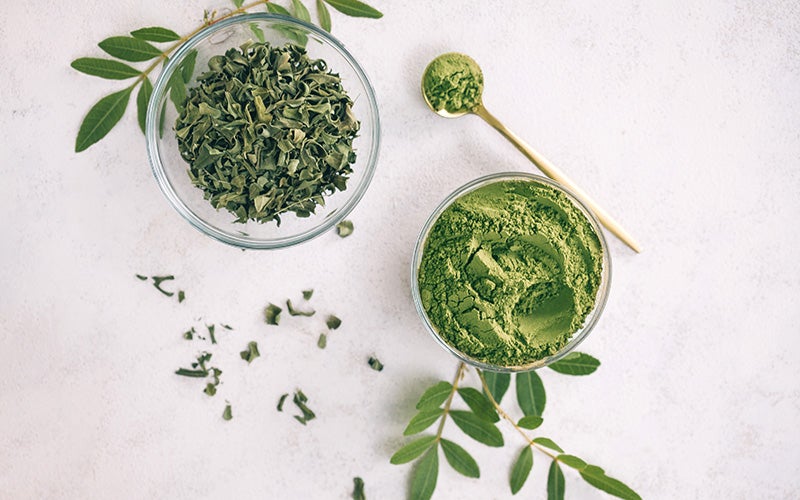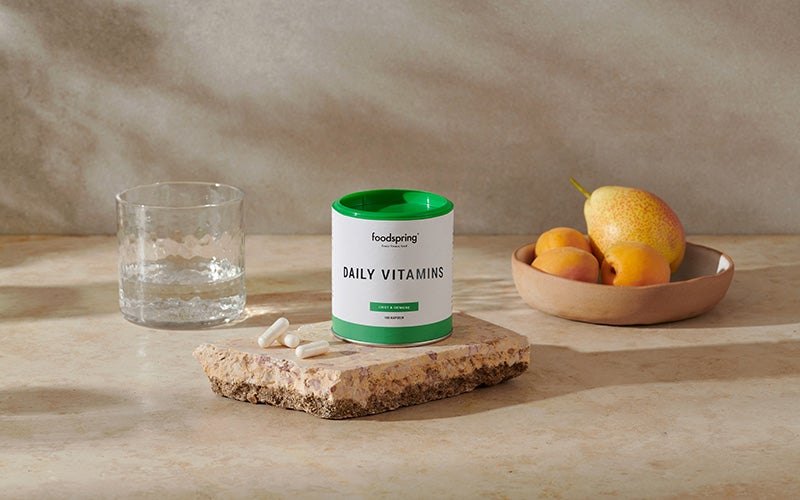Moringa benefits, use, and cool facts about the miracle tree
 ©Irina Lev
©Irina Lev
Among flax and chia, hemp seeds and spirulina, another superfood has crept onto drugstore shelves: moringa. While Moringa oleifera trees and plants have been a basic component of traditional medicine in India for a long time, its popularity in other parts of the globe has only been on the rise for a few years. Yet it is often touted as THE superfood.
We asked ourselves: What are the health benefits of moringa? And who might benefit from this nutrient-rich plant? We’ve taken a close look and compiled the results of our research to help sort fact from fiction.
Moringa oleifera: the miracle tree
The horseradish tree or drumstick tree (Moringa oleifera), with succulent-like trunks, can grow up to 30 meters high. The moringa plant is native to India, and specifically to the Himalayan region in the north. The plant has also been cultivated in many parts of the world, for example in Southeast Asia, Africa, and the Caribbean.
Fun fact: The moringa tree grows at a rapid pace – an average of 30 centimeters per month. In its first year, the tree can already reach heights of up to eight meters.
Nutrients and health benefits of moringa
Many people promote moringa as the best superfood, and as such, there’s a wide range of moringa products. Before we jump on the bandwagon, let’s take a critical look at its nutrients and their effects.
| Nutritional values | per 100g dried moringa leaves |
| Calories | 205kcal |
| Protein | 27g |
| Carbohydrates | 29g |
| Fat | 2g |
Moringa vitamins
- The provitamin beta-carotene is converted by the body into vitamin A, which among other things affects eyesight*. Moringa contains beta-carotene. As a comparison: while the human body can produce about 1,700 μg of vitamin A from 100 grams of carrots, it can obtain about 3,500 μg from the same amount of moringa powder. Impressive, right? For context, an adult’s daily requirement of vitamin A is between 0.8 mg and 1 mg per day.
- Moringa is also a presentable source of riboflavin, better known as vitamin B2. A daily dose of 10 grams of moringa powder will provide you with a whopping 2mg of vitamin B2.
- Lemons are known for their high vitamin C content, which is 50mg per 100 grams. Adults need about 100mg of vitamin C per day. Moringa powder contains small amounts of vitamin C, about 18mg per 100 grams.
Are you looking for the solution for getting an optimal supply of important vitamins? Then discover our Daily Vitamins. Each capsule provides you with everything you need – perfectly dosed.

Minerals in moringa
- With 2000mg of calcium per 100 grams, the leafy moringa contains about twice the amount of calcium as cow’s milk. The daily calcium requirement for adults is about 1000mg.
- The trace element iron is vital for a fully functioning organism. Moringa powder contains 28mg of iron per 100 grams. The recommended daily intake of an adult person is set between 10 and 15mg. Spinach is an even more iron-rich food, with about 35mg per 100 grams.
- Potassium is responsible for many functions in the human body, and among other things it controls the activation of muscle and nerve cells**. How much potassium is in moringa? Moringa powder contains about 1,300mg of potassium per 100 grams. This is about one third of an adult’s daily requirement.
You can find more information about minerals and their functions in our comprehensive article on the subject. Right this way: Minerals at a glance.
Other nutrients in moringa
- Moringa is a rich source of valuable antioxidants. Moringa leaves have different antioxidant plant substances, including quercetin and chlorogenic acid, to help fight free radicals.
- Mustard oils are one of the secondary plant substances found in moringa.
Use of moringa
One special thing about the moringa plant: Almost every part of the plant – root, leaves, stems, and seeds – can be used in food or for medicinal purposes. In Ayurveda, the healing properties of the moringa plant have played an important role for 5000 years. Moringa is mainly found as a powder or in capsule form, as well as tea or oil.
Our recommendation: When buying moringa products, look for an organic seal, which is a sign of a high-quality product free of unwanted chemicals.
Moringa powder as a food supplement
Another thing that makes the superfood especially interesting for athletes: moringa powder contains amino acids, the building blocks of proteins. As a plant protein source, you can incorporate moringa into your diet. But it should be said: moringa powder only provides about 2.5 grams of protein per serving. You’ll need other sources of protein to fully cover your needs.
Discover our dietary supplements! Whether you’re a marathoner, a gym-rat, or a leisurely walker, you’re guaranteed to find the right nutritional supplements for you in our shop.
Moringa benefits for weight loss
It’s just like many other products that promise a quick weight loss. Yes, moringa’s nutrient profile supports your health. No, you won’t reach your feel-good weight just by consuming it. If you want to come up with a nutrition plan for weight loss, we recommend you read this article about losing weight.
Does moringa have any side effects?
The moringa leaf, moringa seeds, bark, moringa root, sap, and flowers – traditional medicine makes use of all parts of the moringa tree. But are there any side effects you should be aware of when taking moringa powder or capsules? No. To date, scientific research hasn’t found any side effects for humans. It’s important, though, not to exceed daily dose recommendations.
Summary
Moringa oleifera is touted as one of the most powerful superfoods. Here’s some of the most important information about its nutrients, effects, and use, at a glance.
- Moringa contains valuable nutrients and health benefits. In particular, it’s high in vitamins B2, C, and E, as well as the minerals calcium, iron, and potassium.
- Moringa powder, which is the most popular form of the superfood, can be used as a dietary supplement, making a small contribution to the coverage of nutrients. Nevertheless, moringa is not able to cover the entire need.
- In Ayurveda, moringa is an integral part of the healing art.
*Vitamin A contributes to the maintenance of normal vision. ** Potassium contributes to normal functioning of the nervous system and muscles.
Sources for this article
We at foodspring use only high-quality sources, including peer-reviewed studies, to support the facts within our articles. Read our editorial policy to learn more about how we fact-check and keep our content accurate, reliable, and trustworthy.






















